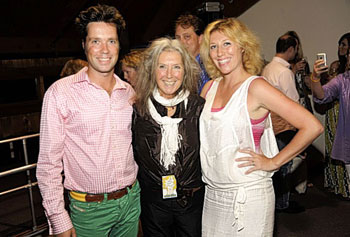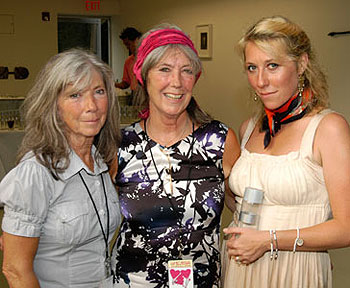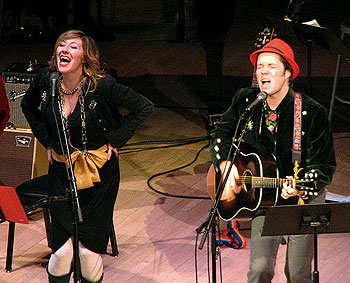Behold Their Majesties, The Wainwright-McGarrigles
Published on May 30th, 2012 in: Canadian Content, Issues, True Patriot Love |By Alex Arnott
When the theme of this issue—Canadiana—was decided upon, I knew that I had to write about the Wainwrights and McGarrigles. Oh, who am I kidding? There’s another word for the Wainwright-McGarrigle clan, and I’m sure it’s already floating around inside the heads of those readers who know them. It starts with a D and ends with a Y.

Rufus Wainwright, Kate McGarrigle, and Martha Wainwright
It should be admitted upfront that the questionable patriarch in this family, Loudon Wainwright III, is not in fact a Canadian. Patriarchs aren’t everything, and I am certain that the surviving family members of this clan would agree. Anyway, there are countless articles detailing the history of those Wainwright-McGarrigles (I liked this one), but this is not one of them.
Suffice to say, once upon a time, say about 1968, there were two young singer-songwriters, Kate McGarrigle (from Quebec) and Loudon Wainwright III (from upstate New York). They met, fell in love, had two children, fell very much out of love, and wrote many intimate songs at the expense of each other all the while. The children, Rufus and Martha, grew up with their mother, Kate, who sang with their Auntie Anna, and their father went away and also continued to sing, often about the children, then he had two more, whom he also left and wrote songs about. Now Rufus and Martha are all grown-up and they too, sing songs about their family.
The autobiographical Wainwright-McGarrigle standard originated with Loudon, and whether retorting, mimicking, or otherwise, this practice seeped through. While some inter- and cross-generational musical conventions may be noted within this great family, the music of its members is never derivative of each other’s, unless it is done so deliberately.

Kate and Anna McGarrigle, Martha Wainwright
“No Biscuit Blues,” by Kate and Anna McGarrigle, is a chirpy sounding song with a darker subject matter than the tune suggests. It details a number of things the women never had as children, including food and jumpers, but closes with the accepting statement, “Well my mammy and me, we don’t want for nothing more.” Rufus wrote a song about his mother, “Beauty Mark,” which appeared on his debut album. The lyrical structure of this song seems to be something of an homage to “No Biscuit Blues.” In it, Rufus sings about ways in which he and his mother differ, including the eponymous beauty mark.
And I do have your red face and long hands . . .
I may not be so manly, but still I know you love me
Even if I don’t have your beauty mark.
Kate wrote the sweet “First Born” in honor of Rufus, while Loudon’s gift to his young son was the amusingly disgruntled, “Rufus is a Tit Man.”
Rufus’ first public “tribute” to his father was a cover of Loudon’s own song, “One Man Guy,” which was my first exposure to the third Loudon of Wainwright (and probably many somewhat younger listeners’ first exposure as well). Loudon’s original is a brutal portrait of the artist, a not!apology to anyone he let down in the past, and subsequently one of his most enduring songs. Loudon has a tremendous wit and a compelling stage presence, both of which have been inherited by his children.

Rufus and Loudon Wainwright III
Photo © Angela Lubrano
Rufus makes “One Man Guy” his own, not through a wild musical rearrangement, but through his beautifully different phrasing of the lyrics. Rufus’ voice loses the edge that sings Loudon’s original, and it could even be mistaken for a love song, particularly the chorus, backed by Martha and accompanied by their childhood friend, Teddy Thompson (yes, son of Linda and Richard, folky contemporaries of Loudon and Kate).
I don’t know why I’m a one man guy, or why I’m a one man show
But these three cubic feet of bone and blood and meat are what I love and know
I’m a one man guy in the evening, the same in the afternoon
One man guy when the sun comes down, I’ll whistle me a one man tune . . .
The gloves literally came off when Rufus released Want One, an opulent, sweeping affair chock full of orchestral anthems. “Dinner at Eight” is a venomous song addressed to Loudon, an open invitation to put up his fists, camouflaged by a haunting piano melody.
No matter how strong
I’m gonna take you down with one little stone
I’m gonna break you down and see what you’re worth
What you’re really worth to me?
Interestingly, Rufus and Loudon’s relationship appeared to grow somewhat stronger after the release of this gut-wrenching song.
Rufus’s next, album, Want Two, contains what can be called typical Rufusian orchestral extravagance, the song “Little Sister.” (Guess who that one’s about?) More recently, he penned “Martha,” which chided his sister for not being in touch as much as he would have liked at a time where Martha was a new mother, and Kate was very ill.

Martha and Rufus Wainwright
Martha isn’t one to take it lying down, either. Her relationship with Loudon was also fraught, unaided by the songs he had written about her (“That Hospital,” “Five Years Old,” “Hitting You”). The standout track on her debut album is almost certainly the contagious “Bloody Mother Fucking Asshole.” The pair collaborated in the unusual “Father/Daughter Dialogue,” which is definitely worth checking out if they’ve piqued your interest.
While Kate’s work was free of the spite that often creeps into the Wainwrights’ songs about each other, her plea to Loudon that is “Go Leave” is a powerful, stripped-down slice of heartbreak.
A sense of place is another common thread that runs through this grand empire. I like to hear the Wainwright-McGarrigles sing in French, something Kate and Anna did quite often, with an all-French release (Entre Lajeunesse et la sagesse) under their belts. Martha has released an entire Piaf covers album, called Sans Fusils, Ni Souliers, à Paris. Rufus’s song “Quand vous mourez a nos amours” was featured on the Moulin Rouge soundtrack. Rufus also draws his listeners into his songs lyrically, whether he’s singing about setting fire to Montreal, strolling through Berlin’s Tiergarten, or best of all, “drunk and wearing flip-flops on Fifth Avenue.”
The junior Wainwrights learned something else from their parents, something very important: to always respect the fans that put them where they are. The family are notoriously grateful for the success they have enjoyed, and always try to meet fans after their gigs, patiently chatting, posing for photos, and offering autographs.
Much as they might appear superficially to despise each other, they are remarkably close for a broken family. Since Rufus and Martha started releasing records, they have often traveled and toured together, or otherwise involved family members, such as Anna’s daughter, Lily Lanken. When Rufus decided to cover the Judy! Judy! Judy! concert at Carnegie Hall, he enlisted the help of his sister and mother, for vocals on “Stormy Weather,” and accompaniment on “Over the Rainbow,” respectively. I saw Martha playing at Edinburgh’s Picture House in 2008, and she invited her mother to accompany her during the encore. “The McGarrigle Christmas Hour” is a festive tradition for family and friends that continued after the death of Kate, with proceeds now going to Sarcoma research, in honor of the late matriarch, who passed away in 2010. It was said that Kate’s final hours were spent surrounded by love, family, and music.
Now there’s another all-new, all-Canadian member of the family: the daughter of Rufus Wainwright and Lorca (daughter of Leonard) Cohen, who are not romantically involved (Lorca’s not exactly Rufus’ type). Lovers of this circle of musicians were equally baffled and excited by this unexpected development.
Her name? Viva! And viva this dynasty.
One Response to “Behold Their Majesties, The Wainwright-McGarrigles”
November 28th, 2012 at 2:09 am
[…] dude! there’s just so much talent in this family. […]
Time limit is exhausted. Please reload the CAPTCHA.